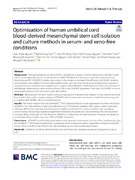| dc.description.abstract | Background: Although umbilical cord blood (UCB) is identified as a source of mesenchymal stem cells (MSCs) with various advantages, the success in cell isolation is volatile. Therefore, it is necessary to optimize methods of cord blood-derived MSC (UCB-MSC) isolation and culture. In this study, we evaluated the efficiency of UCB-MSC isolation and expansion using different commercially available serum- and xeno-free media and investigated the capacity of autologous serum and plasma as a supplement to support cell proliferation. Additionally, we defined the presence of multilineage-differentiating stress-enduring (Muse) cells in the UCB-MSC population. Functions of UCB-MSC in in vitro angiogenesis processes and anti-cancer were also verified.
Methods: Mononuclear cells were isolated using density gradient separation and cultured in four commercial media kits, as well as four surface coating solutions. UCB-MSCs were characterized and tested on tube formation assay, and co-cultured with SK-MEL cells in a transwell system.
Results: The results showed that only StemMACS™ MSC Expansion Media is more appropriate to isolate and culture UCB-MSCs. The cells exhibited a high cell proliferation rate, CFU forming capability, MSC surface marker expression, trilineage differentiate potential, and chromosome stability. In addition, the culture conditions with autologous serum coating and autologous plasma supplement enhanced cell growth and colony forming. This cell population contained Muse cells at a rate of 0.3%. Moreover, UCB-MSCs could induce the tube formation of human umbilical vein endothelial cells and inhibit more than 50% of SK-MEL cell growth.
Conclusions: UCB-MSCs could be high-yield isolated and expanded under serum- and xeno-free conditions by using the StemMACS™ MSC Expansion Media kit. Autologous serum coating and plasma supplement enhanced cell proliferation. These UCB-MSCs had an effect on the tube formation process and an anti-cancer impact. | en_US |

